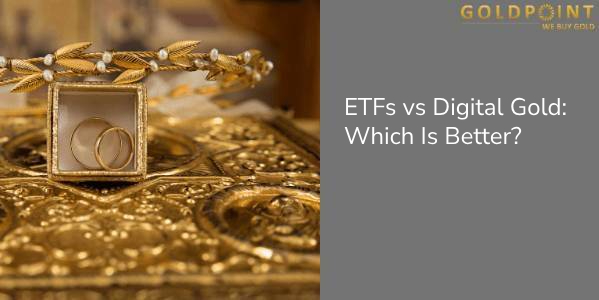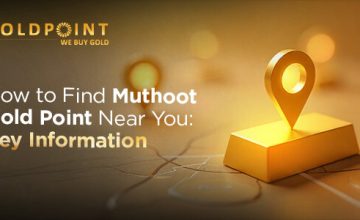
- జన, 30 2024
- | Sell Gold
ETFs vs Digital Gold: Which Is Better?
Gold has always been an attractive option for many investors in India. Recently, the traditional ways of investing in physical gold have been surpassed by more modern approaches such as Gold ETFs (Exchange-Traded Funds) and Digital Gold. With new technologies and reliable platforms like Muthoot Gold Point, it has also become easier to sell gold online in India. Keeping this in mind, people want to invest more in gold. However, it is important to understand what will be better between ETFs and Digital Gold.
In this article, we’ll explore both investment avenues’ differences, advantages, and potential pitfalls. Whether you’re new to gold investment or looking to diversify your portfolio, understanding these options can help you make an informed decision that aligns with your financial goals.
The Gold ETF: What You Need To Know Before Investing?
Gold ETFs present a good opportunity for those interested in digital gold investment but want to avoid the complexities of physically holding the precious metal. Here’s what you need to know:
- Flexibility: Gold ETFs provide unmatched flexibility as they can be bought or sold like stocks through a Demat account. Whether you’re looking to invest in small or large quantities, ETFs cater to all investment sizes.
- Tracking Gold Price: Unlike other investment options, Gold ETFs mirror the gold market, tracking the gold ETF vs digital gold price. This means investors can enjoy real-time exposure to gold price movements without directly owning gold.
- Low Costs: Gold ETFs save you from the high storage and insurance costs typically associated with physical gold.
- Security: One of the prominent benefits of Gold ETFs is that they are stored in highly secure vaults. This significantly reduces the risk of theft or misplacement, providing investors with peace of mind.
- Accessibility: Available through most major brokerage platforms in India, Gold ETFs provide an accessible gateway for individuals to invest in gold. It requires minimal paperwork and can often be managed entirely online.
- Transparency: With real-time tracking of gold ETF vs digital gold price, investors can monitor their investments and make informed decisions. This transparency adds to Gold ETFs’ attraction for novice and experienced investors.
In mutual funds, what is the expense ratio and exit load?
Investing in mutual funds, including Gold ETFs, requires a comprehensive understanding of critical aspects such as the expense ratio and exit load. These factors can influence your overall return on investment:
- Expense Ratio: The mutual fund charges this annual fee to manage and operate the investment. It includes everything from portfolio management fees to administrative costs. The expense ratio typically ranges from 0.5% to 1.5% of assets under management. Lower expense ratios usually signify more cost-efficient funds, though it doesn’t necessarily indicate better performance. It’s a vital factor to consider as it directly impacts the net returns of the investment.
- Exit Load: An exit load is a fee charged when you sell your mutual fund investment within a specific period, usually within one year from the date of purchase. The exit load can be around 1% of the redemption value. It’s designed to discourage short-term trading and ensures that investors remain committed to their investments for extended periods. Understanding the exit load is crucial, as selling your investment without awareness of this cost can reduce your net gain.
Digital Gold
Digital Gold is a revolutionary and increasingly popular w flexible and secure digital format. Here’s why digital gold investment is catching the eyes of investors:
- Convenience: Unlike physical gold, you can buy digital gold in small quantities, even as low as 1 gram. This accessibility makes it a viable investment option for a broader range of people.
- Purity Assurance: With digital gold, purity is assured. Investors receive 24K gold, meaning it’s 99.9% pure, without worrying about impurities, a common concern with physical gold.
- Storage Safety: One of the significant benefits of digital gold is that it’s stored securely in certified vaults. There’s no worry of theft, loss, or degradation, which often accompanies physical gold ownership.
- Real-Time Tracking: With digital gold, the digital gold price is tracked in real-time, allowing for transparent transactions and real-time updates on your investment’s value.
- Liquidity: Selling digital gold is a simple process, and it offers the opportunity to sell quickly at the current market price.ay of investing in gold, particularly in India. It represents a shift from traditional physical gold ownership to a more
Selling Gold Online in India: An Insight
One convenient way to liquidate gold assets is through online platforms. Sell gold online in India is an emerging trend and offers the following benefits:
- Quick Process:Hassle-free and quick with platforms like Muthoot Gold Point.
- Fair Pricing: Transparent pricing with the gold calculation formula clearly outlined to give you the best digital gold price.
- Instant Payment: With Muthoot Gold Point has a simple and quick process; therefore, you can get your payment instantly without unnecessary delays.
Conclusion
Investing in gold remains a timeless method for wealth preservation and growth. The evolution of gold investment from physical possession to digital platforms, like Gold ETFs and Digital Gold, has made the process more accessible and efficient.
In conclusion, these options have distinct advantages and potential drawbacks. Consider your investment goals, risk tolerance, and digital gold cost trends beforehand.










